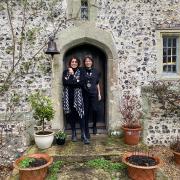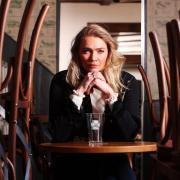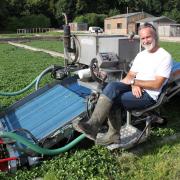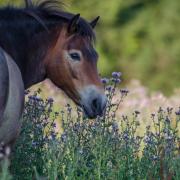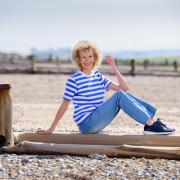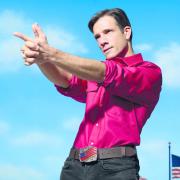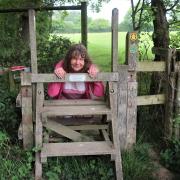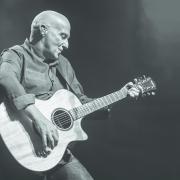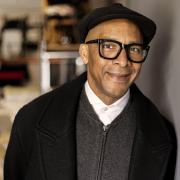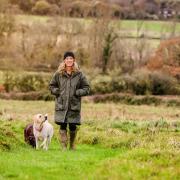Hove-based former Team GB diver Leon Taylor on the brutal realities of Olympic sports, mentoring Tom Daley and why he feared retirement
Many of us vow to be more mindful at the start of a new year, but for former Olympian Leon Taylor, shutting out negativity and background noise is less a nicety than a hard-won necessity.
The Brighton-based diver flew the flag for Great Britain in the 2004 Olympic Games in Athens – scooping the first diving medal for Team GB in 44 years. But he had to keep his cool on the diving board or pay a heavy price.
“I’m there at the Olympics looking at the 15,000 people looking at me in the stadium – bearing in mind on a diving board I’m wearing a pair of tiny Speedos and there’s cameras everywhere. If I start thinking: ‘Oh my goodness I’ve trained for this moment since I was eight years old...’, I’d melt with the pressure.
“The trick is not to think, but that’s hard,” he reasons.
Thankfully, his cool-headedness and that of his diving partner Peter Waterfield paid off. He is the proud owner of an Olympic silver medal, which is stored in a sock “to save it from getting scratched” and ready to be whipped out at talks in schools.
“It travels with me because of the power of its symbol,” he says. “They’re not just given away; it’s only every four years. It’s been going since 1896, it’s the world’s greatest event, so it has a strong message when people see it.”
Even though the medal is in hand, the 41-year-old still marvels at the brutal reality of Olympic sport.
“I was training for six to seven hours a day, six days a week and when it came to the Olympic games, I had five dives to complete. Each dive takes 1.5 seconds. In the event where I won my Olympic medal with my partner Peter Waterfield, every single dive we did counted.
“So the reality is my Olympic medal cost me less than ten seconds of my time but you can imagine the hours and years it took to get there.”
Staying calm when you’re in control of the action is one thing, but watching from the sidelines is a completely different kettle of fish.
Since retiring more than a decade ago, Leon has been a prolific mentor, coaching fellow divers as well as other athletes across different sporting disciplines.
The most high profile of the athletes he mentored was diver Tom Daley, who has two Olympic bronze medals to his name, and is described by Leon as a “wonderful young success.”
Nevertheless, for every success, there are also losses too. “The disappointment hits you harder when you’re the coach and mentor,” he says. “You see that person you’ve mentored has put in so much work and sacrificed so much and for whatever reason, it doesn’t work.”
While a series of shoulder injuries eventually ended Taylor’s career on the diving board, activity is still central to his life and mental wellbeing. A hyperactive child, his parents turned to physical activity for respite, spending hours keeping him entertained in the bath as a baby and then transferring to the local learners’ pool to ‘manage’ him.
“My parents didn’t know what to do with me: I wouldn’t sleep,” he says. “I needed constant attention and they were in a very, very tough place with me very quickly. I was defined as a problem child.”
But soon sport started to have a positive impact, especially at nine when he started diving. “The structured activities seemed to help someone of my hyperactivity. I was able to channel my energy in a productive way, not just causing trouble for all around me. I was able to find a focus and an enjoyment. It gave my life an immense amount of joy. It was my saviour really, certainly my medicine.”
And he believes Sussex is the perfect place to start moving. Moving to Hove with his partner Allie over a year ago, Leon is evangelical about the area.
“We have a rescue dog so the South Downs are incredible for a walk,” he says. “Cycling around here is beautiful, as is running up and down the seafront and getting in the sea.”
But even for splash-happy Leon, mastering the entry to the Brighton seafront is a challenge. “You have to do some sort of crazy walk across the pebbles on Brighton beach and my feet are too soft. They’re not hardened to that surface. It’s comedy, isn’t it, when you see people trying to elegantly go in and instead stumbling? That’s certainly how I do it!”
He’s aware that while he’s content in the open water, many people aren’t and is very much about making small changes to make a positive impact. This year, he’s fronting fish oil brand Bare Biology’s free five-week online campaign to get people training like an Olympian, though he’s keen to point out that seven-hour gym sessions aren’t necessary.
“It’s not about forcing people to go out for a run, I’m just encouraging people to find something they enjoy doing that involves moving. It doesn’t matter what it is; moving more changes your mental wellbeing in a positive way. The statistics of mental health issues are scary: the World Health Organisation has defined stress as a global health epidemic and of course, stress is a precursor to mental health issues.
“I think a good trick many of us are missing is this movement, just getting up to move throughout the day, go for a little bit of a walk, talk a few deep breaths, have a stretch.”
A trained yoga instructor, Leon also helps with his partner Allie’s chain of studios, Yoga Haven, which was founded in Brighton. It’s a varied career, but one that wasn’t granted. “I was in some ways fortunate that in the middle of my career, I had a career-ending injury which thankfully didn’t end my career,” he says. “But what it did was that it made me realise that I had all my eggs in one basket and that was the diving basket. I wasn’t thinking I was going to dive forever but I was behaving like I was going to dive forever.”
Four rounds of reconstructive surgeries later, Taylor started to think carefully about his next steps. He networked with TV people and started to learn the ropes at the BBC. Although TV presenting wasn’t as enjoyable as he hoped, he did find a passion for commentating, as well as platform-speaking.
“When I retired I was scared because I was entering a world that was so unfamiliar and of course there’s no guarantee of work,” he says.
“I’ve found through my mentoring that athletes need as much help after their career as during it. I ask: ‘What are you doing now for when it ends? Don’t do what I did which is bury your head in the sand and think you’re going to do it forever.’ You do need a bit more of a balanced scorecard.”
One person who has kept that in mind is his mentee and Paralympic gold medal equestrian Sophie Christiansen. As well as being an athlete, she is also a statistician. In the next 18 months, Taylor will be busy working with Christiansen for the Paralympic Games, Tokyo 2020.
“I have the joy of working with young athletes who have that grit, determination, spark in their eyes. And I’ll be providing the commentary for the BBC again so I’m very much looking forward to what will be my first trip to Japan for the Olympics and Paralympics.”
Leon Taylor is working with www.barebiology.com to encourage more of us to start moving
More…
• Ray Mears on his wilderness bushcraft school, life in Sussex and what the future holds - Ray Mears reflects on his TV career, why he made his home in the county and what irks him about his imitators




